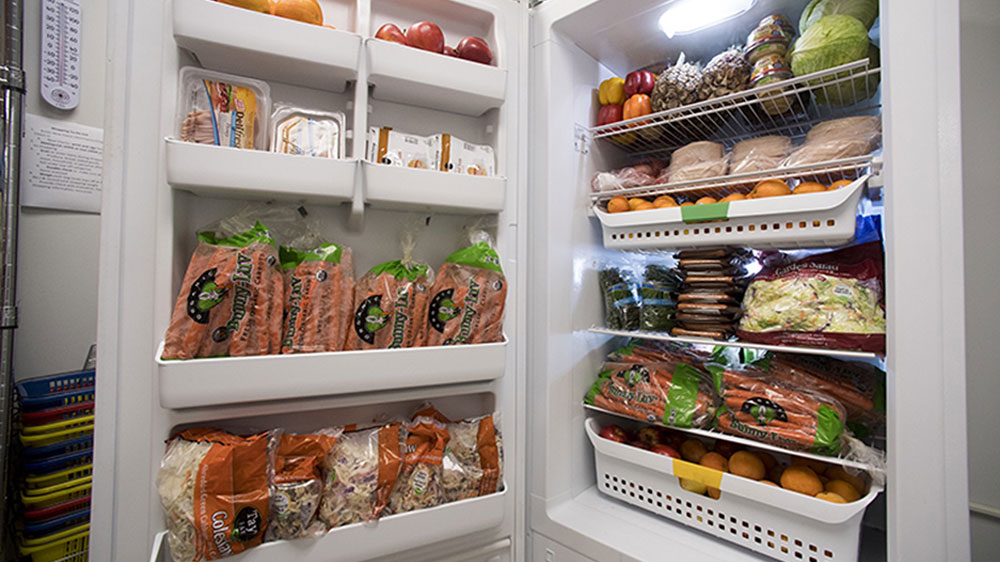It should only take students around 10 minutes to complete—but a new survey could be pivotal in lessening food insecurity on UAB’s campus for years to come.
The Food Access at UAB Study launched November 1 and will be open until the end of the fall semester. Responses from this survey will allow UAB leadership and Blazer Kitchen—UAB’s on-campus food pantry—to better understand the landscape of food insecurity on campus.
 The survey is open to all students, not just those struggling with food insecurity. The hope is for a diverse range of student responses—undergraduate, graduate and doctoral students; students living both on campus and off campus; international, out-of-state and local students—to paint the most accurate picture of food insecurity on campus.
The survey is open to all students, not just those struggling with food insecurity. The hope is for a diverse range of student responses—undergraduate, graduate and doctoral students; students living both on campus and off campus; international, out-of-state and local students—to paint the most accurate picture of food insecurity on campus.
“We need to know as much as we can to do the best that we can with the resources we have to serve,” said Amy Callahan, a UAB School of Public Health doctoral student who revised the original 2018 survey significantly to reflect the new challenges students face in 2022. “If we get [the survey] out to enough people that represent enough of the UAB student population, we’ll get a really good indicator of what proportion of students are experiencing food insecurity.”
Blazer Kitchen, which operates two food pantries on campus, will use results of the survey to guide its planning. Blazer Kitchen is supported by the UAB Benevolent Fund and provides healthy food, resources and referrals to community members and their families.
Benevolent Fund Manager Lisa Higginbotham said students with low food security often struggle to succeed in school.
“When people don’t have access to healthy, nutritious food, they’re not able to succeed and reach their full potential, especially our students who are furthering their education and working to support themselves while getting that education,” Higginbotham said.
On November 17, the UAB community can support the efforts of Blazer Kitchen by giving to Blazers Against Hunger, a one-day crowdfunding campaign. Visit uab.edu/blazersagainsthunger now through November 17 to donate and use the hashtag #BlazersAgainstHunger on social media.
Higginbotham said results from UAB’s last food access survey, conducted in 2018, were instrumental in helping Blazer Kitchen provide support to the students who most needed help. That study found that food insecurity at UAB was about 36 percent.
“I know things aren’t going to look the same as they did,” Higginbotham said. “We’re in a different economic climate now, and we really want to hear from all of our students, whether they’re struggling with food insecurity or are food secure. We want to know what our student population looks like and where we need to focus our efforts.”
The 2018 survey was conducted by Erika Austin, Ph.D., associate dean for academic affairs in the UAB School of Public Health.
Austin said even pre-pandemic, research emerged showing college students were struggling with accessing food, housing and other basic necessities across the country.
“This is particularly important at UAB because we have a different student population at both the undergraduate and graduate level than a lot of campuses,” Austin said. “Most of our students are independent—many work, and many support their families as well. While on some college campuses we assume that most are under their parents’ umbrellas and are still being paid for primarily by their parents in terms of making sure they have housing and money for food, that isn’t necessarily true at UAB. It’s critical that UAB be aware of that and its implications on student success.”
Students can click here to access the survey, which will run until mid-December.
“The image of the starving college student living off of ramen for four years doesn’t have to be the reality, because that’s not healthy,” Higginbotham said. “We want our students to have access to healthy, nutritious food. That’s why Blazer Kitchen is here.”